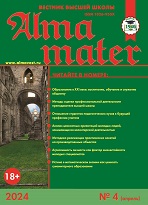UDC 316.6-053:37.01
https://doi.org/10.20339/AM.01-21.022
Zh.S. Safronova is Cand.Sci. (Pedagogy), Ass. Prof. at St. Petersburg state Chemistry Pharmacology University; and D.S. Brazevich is Cand. Sci. (Sociology), Ass. Prof. at St. Petersburg State University of Civil Aviation e-mail: brazevich1986@mail.ru
Analyzed are scientific researches, the authors of which substantiate the concept of intellectual potential and determine methodological foundations for the diagnosis and development of the intellectual potential of youth. The authors of the article considered the concept of “intellectual potential” from the standpoint of various methodological approaches, showing advantages of young people in formation of intellectual potential: speed of mastering new competencies, high creativity, low reproductive inhibition during the development of activities. Problems of development of intellectual potential of Russian young people are revealed. The components of intellectual potential are highlighted, among which a special place is for motivation for mastering knowledge, abilities, skills, willingness to take risks and uncertainty, information culture, etc. It is proposed to determine intellectual potential of young people, based on levels of development of its components. Requirements for educational environment for development of intellectual potential of modern youth are described as well. The conclusion is made, that intellectual potential of modern youth must be formed in a specific educational environment with specific conditions.
Key words: potential, intellectual potential, risk society, uncertainty, higher education, youth, socialization, experience.
References
1. Zubokh, Yu.A., Chuprov, V.I., Williams, K. Youth in society of risks. Moscow: Norma, 2015. P. 82–90.
2. Kulakova, A.B. Intellectual potential of region: theoretical methodological approach. Problems of territorial development. 2017. Iss. 2 (37). P. 3.
3. Kungurtseva, G.F. Intellectual potential of personality: experience in sociological analysis. Omsk scientific vestnik. Sociological & economical sciences. 2010. No. 6 (92). P. 35.
4. Lapaev, S.P., Esenbaeva, A.A. Essence and qualitative component of intellectual potential. Vestnik of Orenburg state university. 2011. No. 13 (132). P. 309.
5. Lapshin, V.A. Human potential of the youth as origin of socio-cultural changes: Author’s thesis of diss. Cand.Sci. (Philosophy). Moscow, 2013. P. 17.
6. Lyubetsky, N.P., Shevchenko, A.M., Samygin, S.I. Intellectual potential of student youth in modern Russia as strategic priority of state youth policy of the RF. Humanitarian, economicak & social sciences. 2016. No. 10. P. 86–90.
7. Ridings, B. University in ruins. Moscow: Higher school of economics, 2010. P. 65.
8. Savchenko, T.V. On the problem of development of intellectual potential of students of higher school. Omsk scientific vestnik. Psychological & pedagogical sciences. 2011. No. 5 (101). P. 170–173.
9. Safronova, Zh.S., Brazevich, D.S., Kosgeleva, D.N. Cognitive mobility in the structure of intellectual potential of personality. Alma mater (Vestnik vysschey shkoly). 2020. No. 5. P. 47–51. DOI: 10.20339/AM.05-20.047











.png)






